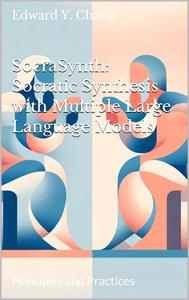
Free download скачать SocraSynth: Socratic Synthesis with Multiple Large Language Models - Principles and Practices
by Edward Chang
English | March 25, 2024 | ASIN: B0CZ4NGMGT | 430 pages | PDF | 186 Mb
This book chronicles the evolution of AI throughout my three-decade career, tracing its trajectory from expert systems to model-based, data-centric, and now context-aware models. It employs the concept of "similarity" to delve into how AI measures the likeness between entities, transitioning from context-independent to context-dependent measures. The measurement of similarity, a fundamental aspect of AI, intersects with disciplines such as linguistics, computer science, psychology, and neuroscience. This narrative illuminates AI's advancement and the increasing complexity of similarity measurement, offering insights into their implications for the field. Additionally, the book contemplates AI's future, particularly with the emergence of large language models (LLMs), providing a comprehensive review of AI's history, current status, and future potentials.
The first chapter provides a broad overview of AI's historical progression, explaining foundational concepts and illustrating the evolution from simple rule-based systems to sophisticated models that account for context. This journey underscores the continual enhancements in similarity measurement and its pivotal role in AI advancement.
The second chapter zooms in on LLMs, representing cutting-edge AI systems capable of handling diverse data types, multitasking, and contextual understanding. While LLMs signify a significant leap forward for AI, they also pose challenges such as hallucination and bias. These issues are discussed alongside ongoing efforts by researchers to address them. Notably, the interpretability challenge is highlighted, as understanding how LLMs arrive at conclusions can impact trust and mitigate bias concerns.
Chapter three explores effective utilization of LLMs, introducing the concept of "prompt engineering" for interaction and incorporating principles from logic and critical thinking to validate LLM-generated information. The CRIT algorithm is introduced in Chapter 4 as a tool to assess argument validity and information reliability using the Socratic method and logic reasoning.
Chapters 5 through 8 introduce SocraSynth, a novel paradigm employing multiple LLMs to explore uncharted topics. By facilitating questioning and debate among LLMs, SocraSynth aims to mitigate biases through conditional statistics. The book elucidates how SocraSynth addresses bias and hallucination issues, exemplifying its applications in diverse domains such as medical diagnosis, sales strategy planning, and investment suggestions.
Subsequently, the book ventures beyond computational realms to discuss the integration of consciousness, emotions, and ethics into AI. The final chapters envision a future where LLMs from various domains engage in dialogue, proposing a novel approach where LLMs converse independently and their discussions are summarized for human comprehension.
This introduction sets the stage for a captivating exploration of the AI landscape, spanning past achievements, current advancements, and future prospects. Together, we will delve into the intricacies of similarity measurement and the transformative potential of LLMs in reshaping knowledge discovery. Join us on this voyage as we interrogate, investigate, and uncover the boundless possibilities at the nexus of AI and human ingenuity!
Buy Premium From My Links To Get Resumable Support,Max Speed & Support Me
FileFox
j6v0o.rar
Rapidgator
j6v0o.rar.html
Uploadgig
j6v0o.rar
Links are Interchangeable - Single Extraction

